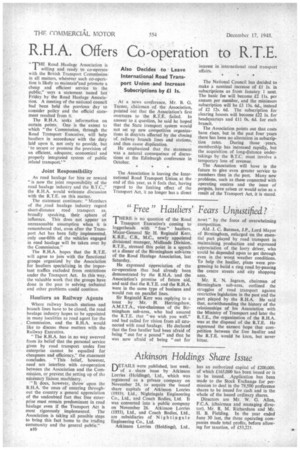R.H.A. Offers Co-operation to R.T.E.
Page 44

If you've noticed an error in this article please click here to report it so we can fix it.
Also Decides to Leave International Road Transport Union and Increase Subscriptions by LI Is.
"THE Road Haulage Association is I willing and ready to co-operate with the British Transport Commission in all matters, wherever such co-operation is likely to rnaintain*and promote a cheap and efficient service to the public," says a statement• issued last Friday by the Road Haulage Association. A meeting of the national council had been held the previous day to consider policy and the official statement resulted from it.
The R.H.A. seeks information on certain points. One is the extent to which "the Commission, through the Road Transport Executive, will help hauliers in accordance with the duty laid upon it, not only to provide, but to secure or promote the provision of an efficient, adequate, economical and properly integrated system of public inland transport!"
Joint Responsibility
As road haulage for hire or reward "is now the joint responsibility of the road haulage industry and the B.T.C.," the R.H.A. would welcome discussion with the R.T.E. on this matter.
The statement continues: "Members of the soad haulage industry regard short-distance road transport as, broadly speaking, their sphere of influence. This does not appear an unreasonable assumption when it is remembered that, even after the Transport Act has been fully implemented. only one-fifth of the vehicles engaged in road haulage will be taken over by the Commission."
The R.H.A. hopes that the R.T.E. will agree to join with the functional groups organized by the Association for hauliers specializing in the important traffics excluded from restrictions under the Transport Act. In this way, the valuable work that the groups have done in the past in solving technical and other problems could continue.
Haulers as Railway Agents
Where railway branch stations and branch lines have to be closed, the road haulage industry hopes to be appointed in many localities as road agent for the Commission, and the R.H.A. would like to discuss these matters with the Railway Executive.
"The R.H.A. has in no way swerved from its belief that the personal service given by road transport undec free enterprise cannot be equalled for cheapness and efficiency," the statement concludes. "This belief, however, need not interfere with co-operation between the Association and the Commission, or prevent the setting up of the necessary liaison machinery.
It does, however, throw upon the R.H.A. the onus of ensuring throughout the country a general appreciation of the undoubted fact that free enterprise must remain predominant in road haulage even if the Transport Act is most rigorously implemented. The Association is taking all possible steps to bring this fact home to the trading community and the general public." el0 At a news conference, Mr. B. G. Turner, chairman of the Association, pointed out that the Association's first overtures to the R.T.E. failed. In answer to a question, he said he hoped that the State transport system would not set up new competitive organizations in districts affected by the closing ofrailway branch lines and stations, and thus cause duplication.
He emphasized that the statement was a natural consequence of discussions at the Edinburgh conference in October.
The Association is leaving the International Road Transport Union. at the end of this year, as it feels that, having regard to the limiting effect of the Transport Act, it no longer has a direct interest in international road transport affairs.
The National Council has decided to make a nominal increase of £1 Is. in subscriptions as from January 1 next. The basic fee will become £2 I is. per annum per member, and the minimum subscription will be £3 13s. 6d., instead of £2 12s. 6d. The subscription for clearing houses will become £22 Is. for headquarters and £11 Os. 6d. for each branch.
The Association points out that costs have risen, but in the past four years there has been no alteration in subscription rates. During those years, membership has increased rapidly, but the acquisition of long-distance undertakings by the B.T.C. must involve a temporary loss of revenue.
The Association will have in the future to give even greater service to members than in the past. Many new problems, such as those connected with operating centres and the issue of permits, have arisen or would arise as a result of the Transport Act, it is stated.




























































































